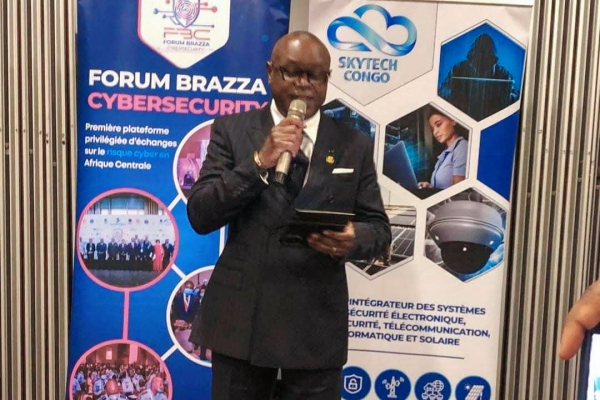Without robust security measures, digital transformation in Africa risks failure. In Congo, where significant investments are driving ICT growth, a strong focus on digital security is placed on protecting online users and safeguarding critical systems.
Léon Juste Ibombo (photo), Congo's Minister of Posts, Telecommunications, and the Digital Economy, delivered the keynote address on Monday, November 25, at the second edition of the Brazza Cybersecurity Forum. He emphasized the critical importance of digital security in light of the exponential rise in cyber threats across all sectors and affirmed that cybersecurity lies at the heart of Congo's strategic development.
"Cybersecurity is no longer optional but an imperative in an increasingly connected world," Ibombo said.
In recent months, Congo has ramped up strategic partnerships as part of its national digital transformation strategy, "Congo Digital 2025." Although cybersecurity is a priority within this initiative, the country remains behind in this domain. According to the Global Cybersecurity Index 2024 published by the International Telecommunication Union (ITU), Congo is ranked in Tier 4 with a score of 27.61 out of 100, highlighting significant gaps in digital protection and underscoring the urgency to accelerate efforts. It was thus placed in the “Evolving” category.
"Evolving represents countries that obtained an overall score of at least 20/100 by demonstrating a basic cybersecurity commitment to government-driven actions that encompass evaluating, establishing or implementing certain generally accepted cybersecurity measures in at least one pillar, or several indicators and/or sub-indicators," the ITU explained in its report.
Congo lags in four of the five pillars comprising the index. While it scored 14.12 out of 20 in legal measures, it earned a dismal 0 out of 20 in technical measures, 0.72 in capacity building, 3.9 in organizational measures, and 8.87 in cooperation with regional, continental, and global partners.
To achieve its goal of becoming a technology hub, Congolese authorities must prioritize several actions. These include establishing technical infrastructures such as Computer Emergency Response Teams (CERT/CSIRT) and cybersecurity threat protection measures, investing in education, awareness, and research to build cybersecurity skills, and forging international and regional partnerships to combat cyber threats. Active participation in agreements and collaborative initiatives will also be essential.
Adoni Conrad Quenum



















